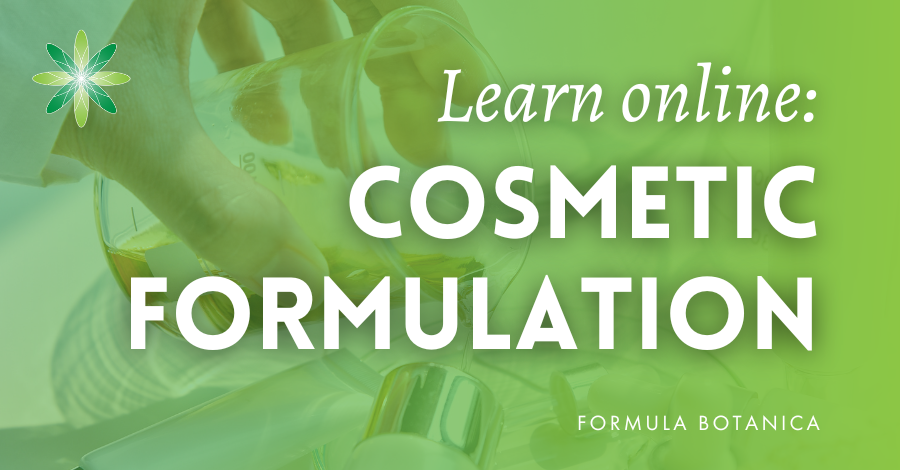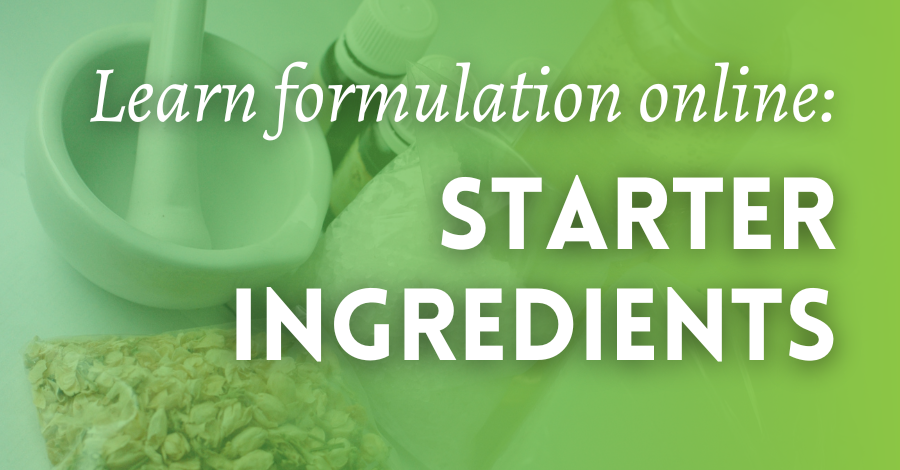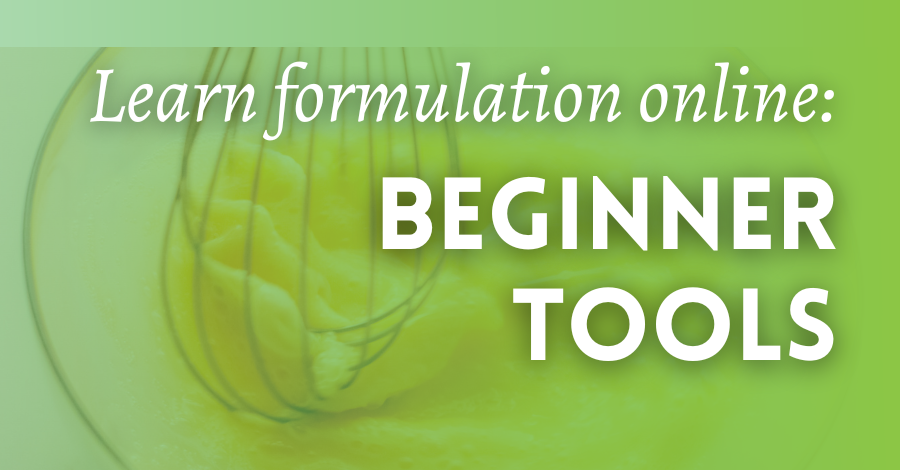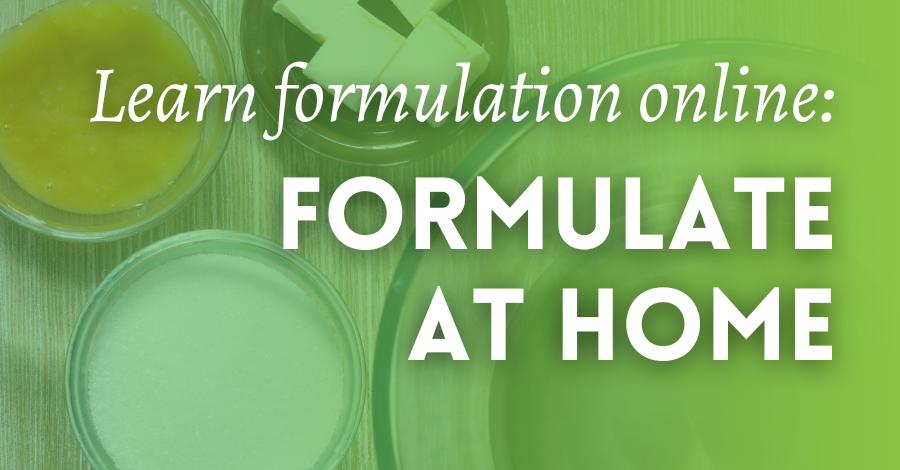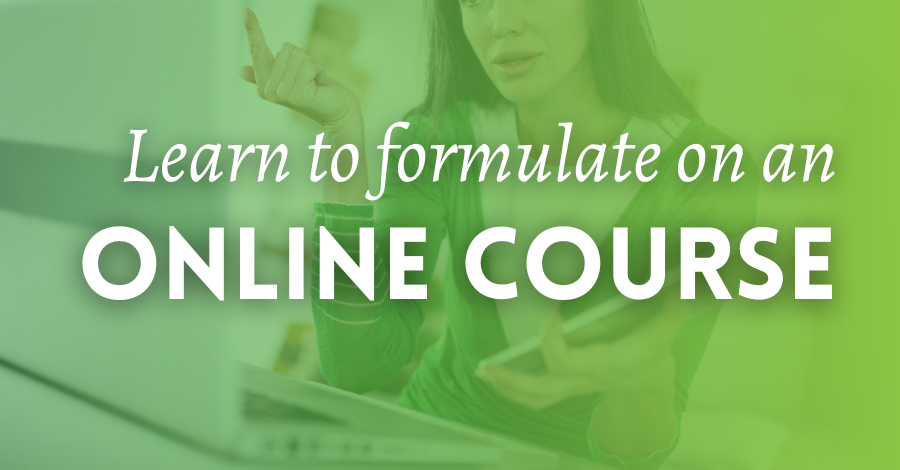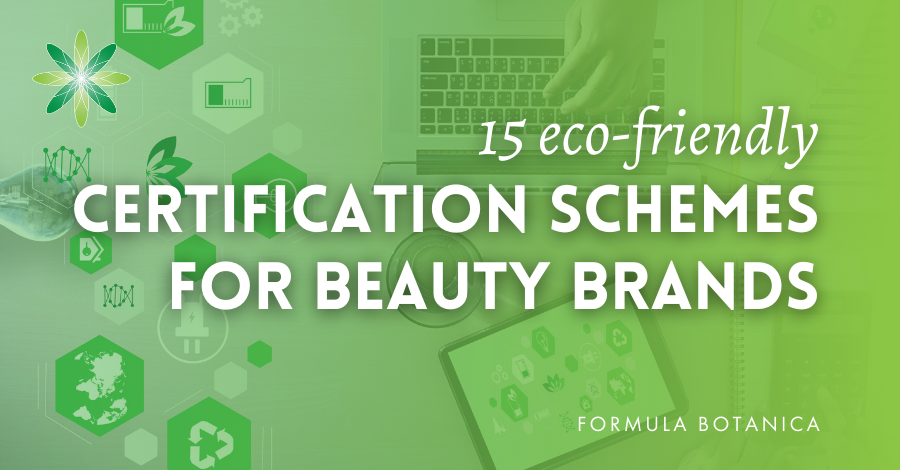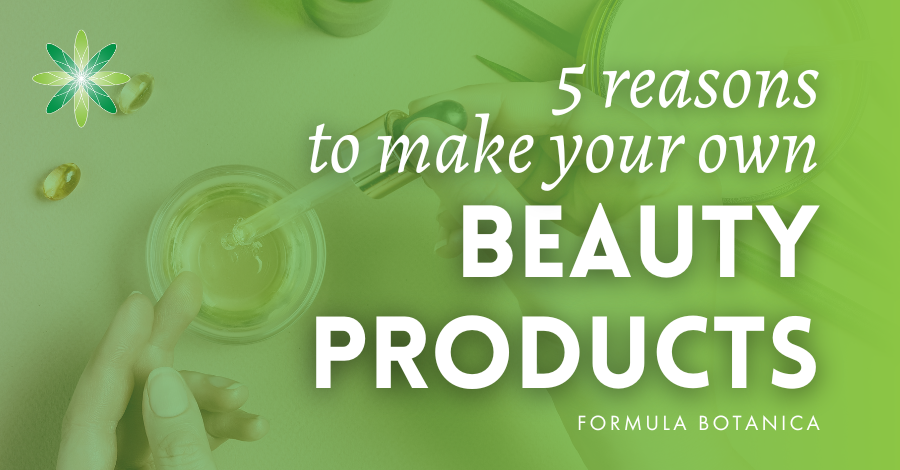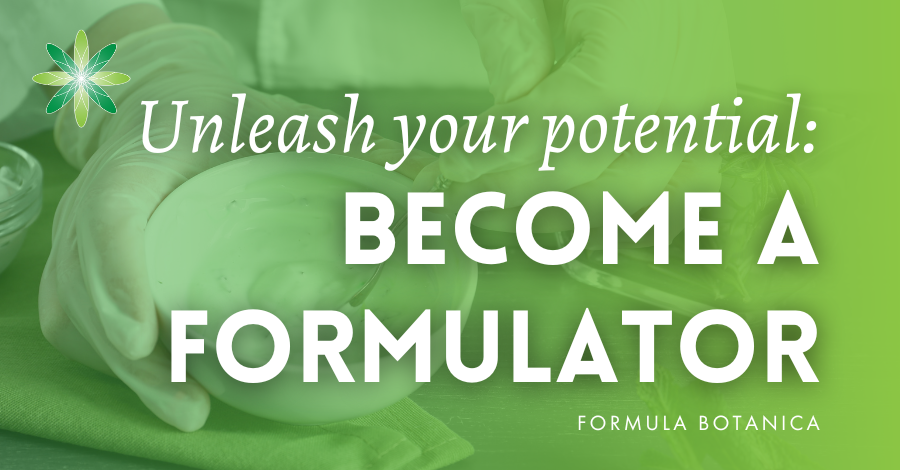Do you wonder if you are getting value for money when you buy cosmetics? Do you want to understand exactly what goes into your skincare? Do you think there is a lot of greenwashing in the beauty industry? Are you confused by the many ingredient claims cosmetic firms make?
If these are issues that cross your mind, then it may be just the right time to start learning to make your own natural and organic skincare at home. Learning to formulate is empowering and rewarding. Not only do you have full control over what goes into your skincare and can personalise it, but natural formulation can also be a fun and engaging hobby for you and of benefit to your family and friends. It may even lead to a life-changing new career as an artisan skincare formulator or indie beauty brand owner.
Plus, making your own skincare can save you money in the long run and help you make more sustainable choices, such as buying ingredients from local suppliers and growers and making your own ingredients such as herbal macerates, tinctures and glycerites.
However, many people are hesitant to try their hand at formulating because of common misconceptions, such as needing a background in science (which you don’t) or that it’s too difficult to learn how to make skincare on an online course, which it isn’t, as our 18,000-strong student community shows.
In this blog post, we’ll address these concerns and show you how easy, flexible and accessible a natural skincare course online is in teaching you how to formulate your own cosmetics. We also bust the myth that it takes a lot of time and money to make your own skincare. Let’s give you a hint: if you can cook some basic recipes in your kitchen, then formulating organic skincare is well within your reach. You can start learning how to make skincare with only some basic kitchen tools and a few key ingredients, as thousands of Formula Botanica graduates have done.
Formulating skincare: no barriers to entry
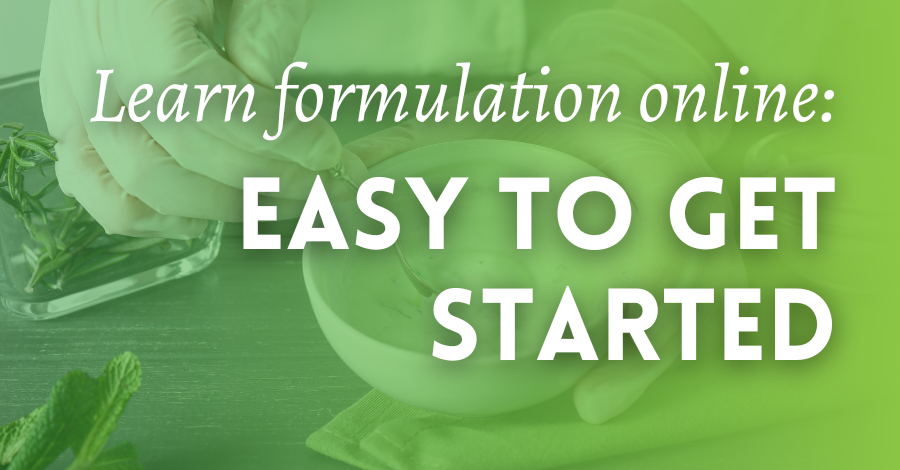
8 reasons to make your own skincare even if there’s plenty to buy
There really are no barriers to entry, and products like moisturisers are well within the home formulator’s reach. You can unleash your potential as a cosmetic formulator without needing a chemistry degree as you can learn on the job, gaining a deeper understanding of your ingredients and the processes involved as you go along, at your own pace. To reassure you, listen to our podcast, in which we explain the differences between a cosmetic chemist and natural formulator and dispel the myth that formulation is something only mainstream cosmetic labs can do safely and effectively.
Episode 37: Do you need to be a cosmetic chemist to formulate skincare?
Sourcing cosmetic ingredients: easier than you think
A decade or so ago, it might have been harder for the home formulator to source raw, natural cosmetic ingredients in smaller amounts at a good price. But, thankfully, times have changed. With the groundswell of natural cosmetic formulators – our Formula Botanica community is over 300K strong on social media, and we have students from over 180 countries – there are retail cosmetic ingredient suppliers near you, in your country or region. Within our supportive online community, you will find someone in your area with tips about where to buy ingredients.
We provide our students with a supplier guide, and you will find that we suggest where to buy ingredients at the end of the free formulations on this website. You will need to shop around, check shipping prices, and plan (don’t be tempted to overbuy), but with the key foundation ingredients readily available, there is no excuse not to start formulating. We always recommend starting out buying a few versatile, cheaper botanical butters, oils and waxes that can be used in many different types of formulation. For some inspiration, take a look at these lists:
5 tips on how to buy natural cosmetic ingredients
Top 10 botanical oils every formulator needs
5 Amazonian butters for organic skincare formulations
6 vegan waxes for organic cosmetic formulation
Start formulating with just 6 tools
You do not need shiny, stainless steel homogenisers, blenders, stirrers, or anything huge and lab-scale in size to formulate skincare at home. We have all seen glitzy mainstream cosmetic brand adverts with scenes of white-coated cosmetic chemists in high-tech labs. They give the impression that this is the (only) environment in which commercial cosmetics can and, by inference, should be made.
But you can formulate skincare very successfully at home, in a hygienic, sanitised corner of your kitchen – or even a spare bedroom – with just 6 key tools when you are starting out learning to formulate. What is more, these tools are probably ones you already have on hand at home, or can buy cheaply online. We’re talking about a few stainless steel spoons, silicon spatulas, a few glass beakers, a hot plate, a few pans, and cheap digital jewellery scales. Just make sure you buy new tools for formulating and keep them separate from your regular kitchenware.
These articles list everything you need to invest in at the outset and provide tips on what to buy and what not to buy. Our students and tutors offer some very practical advice, too.
Top 6 lab tools every new formulator needs
Beginner’s guide to setting up a home formulation lab
Behind the scenes in our students’ labs
You can make safe, effective cosmetics at home
One of the reasons people hesitate to formulate cosmetics at home is their worry that their products won’t be safe. There are two prongs to this, so let’s unpick them to reassure you. Firstly, there is the issue of home safety and manufacturing cosmetics according to good manufacturing practice (GMP), and secondly, there are the training standards to consider, which we cover in the next section.
With students in over 180 countries, it is clear that it is possible to learn to formulate following a natural skincare course online from almost anywhere in the world. We’ve had students follow our courses and practise their formulations in hotel rooms while on business trips and in caravans as they tour. It’s possible if you have passion and determination.
If you wish to start a cosmetics business and become an indie formulator and business founder, in most countries you are able to do so from home, so long as you follow any national or local legislation governing cosmetics’ regulations and manufacturing. We explain the key things to research in these articles below, but it is perfectly possible to do the creative formulation yourself and then outsource manufacturing if this is required in your country or local jurisdiction.
Do you need a licence to sell skincare products?
Start a small beauty business at home
7 things to ask before you start a cosmetics line
Beginner’s guide to setting up a home formulation lab which also covers good manufacturing practice (GMP).
The benefits of a natural skincare course online
At Formula Botanica, we offer award-winning courses backed by an accredited eLearning platform. This means that you have structured, effective, and proven curricula offering stellar learning materials and pathways. With nearly 2,000 reviews on Trustpilot, of which 93% are five stars, our online courses are successfully helping grow the goundswell of natural, organic formulators globally.
Our diploma and certificate courses from beginner to advanced levels in organic skincare and haircare, as well as beauty brand business management, have undergone rigorous assessment in terms of content, structure, and methodology, including how we teach, guide, support and assess our students. Written by a team comprising our cosmetic chemist, course leads and education tutors, our course materials are constantly updated. We also offer the latest insights into the beauty industry in our membership site, The Lab at Formula Botanica, which runs expert masterclasses and interviews with leading names in beauty.
Choosing the right natural skincare course to follow online is not only about teaching quality and value for money. It is also about the interaction you have with tutors and other students and the level of support and mentoring you receive to help you achieve your goals and unleash your potential as a formulator.
At Formula Botanica, we put energy and resources into supporting you as a student with frequent, informative, and lively online study sessions. Our Online Classroom – our additional Facebook groups, and our 85K-strong Skincare Entrepreneur Mastermind community – is abuzz with voices from your counterparts across the world who share your learning journey and offer support. Find students local to you, and you have a goldmine of tips on sourcing ingredients, for example, or about formulating with native botanicals.
Can you learn to formulate with an online course? Most definitely, and we cover all the reasons why as well as give you tips on how to make the most of your natural skincare course online in this guide:
Conclusion
Don’t just take our word for it; we have over 300 Formula Botanica graduate and student beauty brands showcased in our online gallery. Each has a different background, and most started with little or no experience in skincare formulation.
What they have in common is a passion for natural, organic cosmetics and a clear purpose to make a difference with their brands. Head over to browse the gallery for inspiration about where learning to formulate can take you. Find indie beauty brands in your part of the world and realise that you can join them. A rising tide of natural formulators lifts all boats in our mission to teach the world to formulate, including you.
FREE TRAINING
Learn how to become an
Organic Skincare Formulator
FREE TRAINING
How to become an
Organic Skincare Entrepreneur
FREE TRAINING
How to become an
Organic Skincare Entrepreneur
Leave us a comment
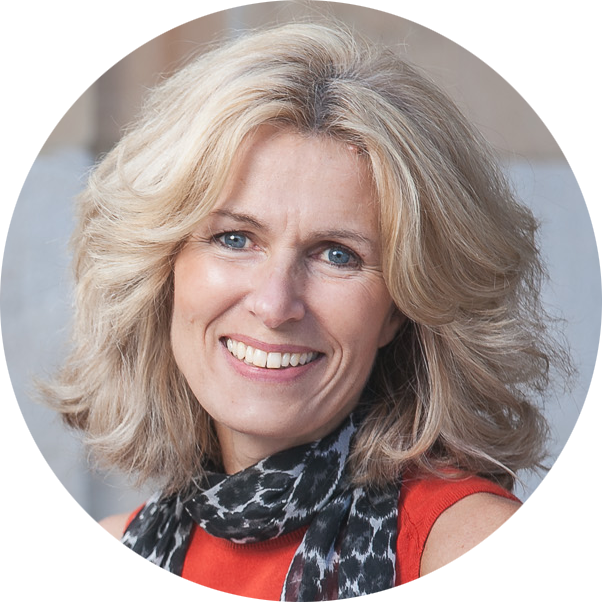
Liz was Formula Botanica’s Content Coordinator between August 2020-2024. Liz worked as a professional blogger, journalist and site developer for many years and was also part of the Formula Botanica student community. Read more about the Formula Botanica Team.

